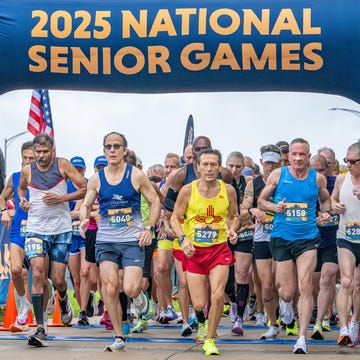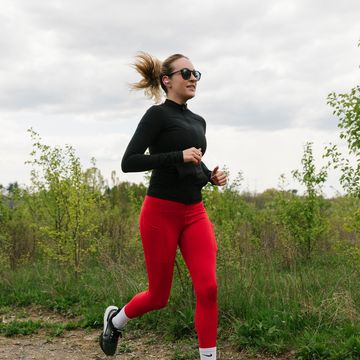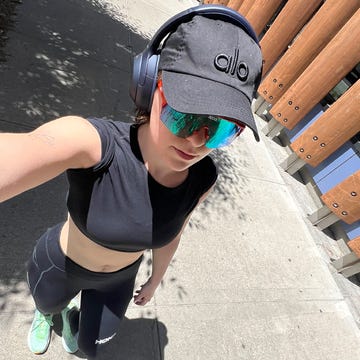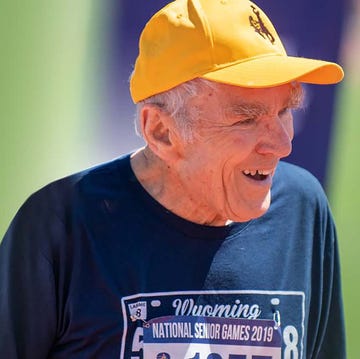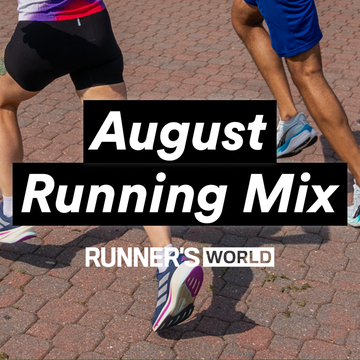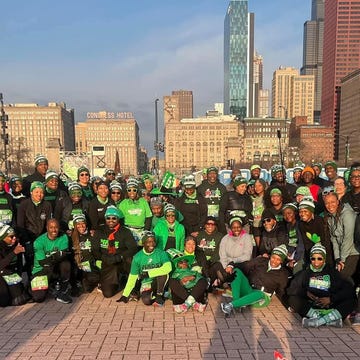Nicholas Thompson, 49, isn’t wanting for accomplishments—personal nor professional. The CEO of The Atlantic ran a 2:29 marathon at 44 years old, shattering his years-long plateau of 2:43s. Thompson is a former editor for The New Yorker, where he covered the 2013 Boston Marathon bombing, and the former editor-in-chief for Wired, for which he wrote about trying out the recently launched Nike Zoom Vaporfly 4% super shoes.
Thompson holds the American record in the 50K for the 45-49 age group (3:04:36), which he ran a few minutes behind his friend, Des Linden, who set the world record in 2:59:54.
The father of three prides himself on a close relationship with his wife and his sons, always prioritizing them, but still finding a way to be on top of his work and running games. For example, Thompson, who lives in Brooklyn, never rides the subway to his lower Manhattan office. He runs to and from work, logging eight miles while listening to podcasts and audiobooks. He tries to be as efficient as possible, which is, perhaps, how he managed to write his second book: The Running Ground: A Father, a Son, and the Simplest of Sports (October 2025).
Thompson spoke with Runner’s World about the book, which is in some ways, a memoir, but in other ways a look at the sport of running and how the most simple act can be so complex. It features portraits of well renowned runners, including Bobbi Gibb, who have flitted in and out of Thompson’s life in serendipitous ways.
Runner’s World: Why did you decide to write this book and why now?
Nicholas Thompson: I was really interested in the question of how I had gotten so much faster in my early 40s. I didn’t quite understand it. When I started thinking about that I started going deeper into it.
The first revelation was obvious: I was training harder. And drinking beet juice. That was clear. The second revelation was that it probably had something to do with my father. My personality was clearly influenced by him, the way I lived was influenced by him. He was someone I wanted to be and not be like.
The third revelation was that I’d been stuck as a runner. I had been subconsciously fixated on being as fast as I was before I had cancer. But there was a moment, which I describe in the book, about realizing that I hadn’t been able to run faster because I hadn’t wanted to. It made me realize that what I had gone through to get faster was not a fairly simple story of, guy straps on super shoes, he drinks beet juice, runs harder workouts. But it was a much bigger story about how he relates to his parents and to other people, and how we understand what drives us and what holds us back.
Who is this book for? Is it for runners? Is it for fathers trying to understand their kids? Kids trying to understand their fathers?
I hope it’s also about mothers and their daughters. In the most narrow sense, it’s for elite middle-aged men who are trying to get faster. It’s for runners. Running is a simple act that transcends speed and gender, and my hope is that this book is for anyone who runs or for people who don’t run but want to get insight into how this sport opens up different questions in our lives.
Something you reference quite a bit in the book is about how your father stopped running when you very much have not. Do you think running (or no longer running) was actually what changed the trajectory of your life versus your father’s?
I don’t know. We weren’t going to be on the same trajectory. I’m not as susceptible to addition. I’m not as insecure. But I definitely think I had commitment from watching him that I would try hard not to let my discipline drop, and running was a part of that. If I had quit running, let’s say I broke my leg and couldn’t run, I think I still would have figured out a way to hold onto the discipline, and I wouldn’t have let things spiral like my father did.
For a long time you saw anything other than “basic” data as a distraction, and that you kept track of time with a stopwatch and guessed at the mileage. This is surprising given you really are a king of tech. When did this shift change? Do you regret being so dialed in now? Are there times that you run tech-free? Not yet?
I wish I had better data from when I was younger. But my goal has always been, how do you train intensely and have lots of time for other things? The way to do that is to make sure when you’re not training to turn it off.
My belief was if I was tracking everything meticulously I’d have a harder time turning it off, for example, going back into my heart rate data at night. I didn’t want to spend more time on it. But now, I realized I can track data and turn it off. And that heart rate data is incredibly helpful; it helps me race better.
This is like proving a negative, but based on everything you know about yourself and your father and his father, and, with the benefit of hindsight: If your father hadn’t introduced you to running, would you have found the sport?
I might have because I would have still gone to school where I got cut from the basketball team. And really, getting cut from the basketball team is what turned me into a runner in high school. If I hadn’t gotten cut, I would have played JV basketball and probably would have joined the Central Park Track Club in my mid 20s.
My father taught me about running, and it was deeply ingrained in me. But if I hadn’t gotten cut from basketball, I never would have realized my talent. Running in high school also made me realize I was good at something and that helped me get good at more things.
The subtitle of your book is “a father, a son, and the simplest of sports.” Do you really believe running is the simplest of sports?
A copy editor asked me to prove it’s the simplest sport. [Editor’s note: Of course the copy editor did this.] But I stand by it [in a physical sense]. [Otherwise], clearly, it’s not, and that’s the point of the book. Because [running] is such a simple thing it can take you to more complex places. It’s just you. You’re thinking in your own head, meditating as you go. Its simplicity opens up complexities.
During COVD-19 lockdown, you were living and running in the Catskills. You asked yourself whether it’s better to run a little slower to help your future self beat your quarantine Strava segments. Is it?
No, it’s not. Because we were in quarantine, I was racing against myself. If I hold back it’s easier to beat [me in the future]. But that doesn’t feel as good. I genuinely believe that everything you do creates a little habit of some sort. I think about that in workouts when I want to quit: If I’m running 8x800 and I feel terrible after six of them and want to stop, I tell myself that the amount of time I’m working out while preparing for a marathon is limited. That 8x800 is really just 20 minutes of hard running a week. [These workouts] determine how you do in the marathon you care so much about.
If you do something right, these little habits make it easier to do the next thing right. If you do something wrong, it’ll be easier to do the next thing wrong. That’s what my dad said when it came to affairs. The first one is hard, the 100th one is easy. The best number is zero.
So, Nick, how do you do it all?
There are a couple of things. You have to be efficient in how you do it. There are hundreds of hacks I use to make my training more efficient. I commute to and from work, that’s eight miles roundtrip. I’m not focused on performance; I’m listening to podcasts or audiobooks. I’m more productive with work there than I would ever be on the subway.
I brush my teeth while standing on one foot because I need balance work for my core. Why take the extra time to do core work when you can create a habit and do it while brushing your teeth? On a Sunday evening if I have to finish a book, I’ll listen to an audio version while I’m doing planks.
I feel like running creates habits that make you better at anything. In some ways, training for intense running has helped me with an intense job. You need a lot of the same skills to run a two-hour staff meeting as you do to run for two hours.
I sleep a reasonable amount because if you don’t sleep, you don’t recover. If you have a job like mine, there’s a temptation to stay up until 3 in the morning, but if you’re training you just can’t do that. So training forces better habits on you across the board.
You asked me once if my husband would prefer it if I stopped running, assuming it would not change anything about my personality. Have you asked your wife this?
We’ve talked about it elliptically. My guess is she would be delighted. My running is kind of a burden. Sometimes it’s “who’s going to take which kid to which game,” and running gets in the way. The other weekend it didn’t get in the way, but it was slightly annoying: One kid had a soccer game, and I ran to it, and my wife drove him. We got there about the same time and we watched together and drove back together. She probably would have preferred I had driven with her. But I watched the game, and that was the important part.
I think if everything could stay the same, she’d probably be happy if I didn’t have the commitment. But she also knows running is a really good place for me to clear my mind, to keep me healthy and relaxed.
When will it all be enough?
I sometimes wonder when I will stop running. And that’s presumably when I can no longer do it. And then I’ll walk. I think about Michael Westphal [a runner who appears in Thompson’s book] and how, with his Parkinson’s, he’d run for as long as he could.
The other question is when will I stop being so goal-oriented. And there have been a few times when I thought I was at the end, that I can just relax and run and not enter any marathons. But I don’t think that will happen for a while.
Heather is the former food and nutrition editor for Runner’s World, the author of The Runner’s World Vegetarian Cookbook, and a nine-time marathoner with a best of 3:23. She’s also proud of her 19:40 5K and 5:33 mile. Heather is an RRCA certified run coach.







